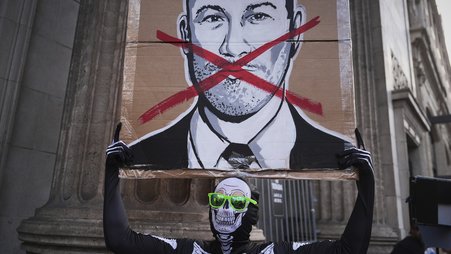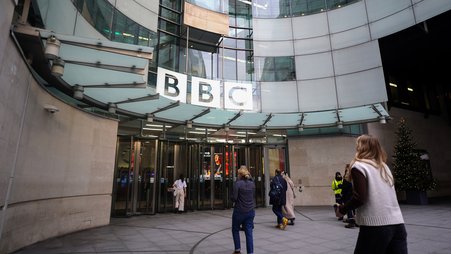James Goodale, former vice chairman and general counsel of The New York Times, has seen it all when it comes to press freedom. He was involved in all four cases that the Times took to the Supreme Court — ranging from libel law to reporter’s privilege — and led the paper’s fight against the Nixon administration’s war on press freedom, most notably in the historic Pentagon Papers case.
We recently sat down with Goodale to discuss the Trump administration and its multipronged effort to stifle the rights of journalists, particularly by extracting settlement payments from media outlets baselessly sued by Donald Trump. This interview has been edited for brevity and clarity.
Even before it handed over its “60 Minutes” transcript to the Federal Communications Commission, there’s been talk that CBS will settle Trump’s $10 billion lawsuit. What does it mean for the media and press freedom if CBS decides to settle the suit?
If CBS decides to settle, it will be an absolute disaster for the press. It would be one more domino falling down, handing Trump an undeserved victory against the press. I wrote an article for CJR about ABC cowardly setting its case in which George Stephanopoulos said “rape” instead of “sexual abuse,” but since then, Facebook has settled Trump’s even more outlandish suit, and for what? CBS should be standing up and fighting Trump. If I’m them, I’m not letting Trump make me look foolish. Because if it happens, there will be no end. Trump will bring lawsuits against every part of the media, and it will put pressure on everyone else to settle.
Let me make clear that the lawsuit is a bunch of nonsense. Trump’s legal theory doesn’t exist anywhere in the law, and so not only is the settlement bad in terms of putting the onus on everyone else to settle, but the entire premise of the lawsuit is ridiculous. News outlets are allowed to edit interviews! Hard to believe it even has to be said.
To your point, it’s not a traditional libel suit like in ABC’s case. They are using this fairly novel and dubious theory essentially saying that interview editing violates consumer protection laws. Have you ever seen anything like that in your time as general counsel of The New York Times?
The suit is from Mars. To my knowledge, I’ve never seen a suit brought like this one where editing is being criticized as constituting consumer fraud. It has no basis in law as far as I’m concerned, and what’s going to happen — if, in fact, the case is settled — is there will be more consumer fraud cases every time the media edits an interview, not only with Trump, but other politicians. And the First Amendment will suffer.
“The suit is from Mars.”
You wrote in your CJR article about how you led the efforts by the press to push back against the Nixon administration in the early 1970s, when it was subpoenaing journalists, using government agencies to retaliate against news outlets, and even trying to censor them in the Pentagon Papers case. What was your response back then and what’s changed?
Well, first of all, the response by the press as we speak has been pathetic. There’s no spokesperson for the press who is out there leading the charge and coordinating a united front with all the news outlets on the same page.
Back in the Nixon administration, I first took that on, but there were others who willingly stood up and fought. CBS is actually a great example. Its president at the time was a gentleman named Frank Stanton. Congress was trying to subpoena outtakes from a CBS news interview. Stanton told Congress he would not under any circumstances turn over outtakes of any of its shows. Now compare that with what CBS is doing now. It has taken all its material and delivered them to the FCC without so much as a peep, and made no claims of confidentiality with respect to the editing process.
Now you asked me what happened way back then. If that happened, I would’ve been screaming and shouting from the rooftops, but thankfully I didn’t have to. Frank Stanton stood up and was able to effectively persuade Congress to revoke the request for the subpoena.
Now what’s changed is that we have a master of media, Trump, who despite everything you can say about him, is still an absolute genius with respect to attracting attention to himself. So someone has got to stand up to him who also attracts attention. If not, there’s no end of the damage he can cause.
“The giant corporations should make it their business to defend the First Amendment, or stay the heck out of the news business altogether.”
When you look at ABC and CBS — maybe this was somewhat of the case back then, but it is surely more of the case now — they aren’t owned by companies that just own media outlets. They are gigantic conglomerates in which news organizations are a small piece of the pie. And they seem to be making decisions based solely on their larger corporate interests. What’s the impact on the First Amendment when they have relatively little economic interest in defending freedom?
Well, the economy obviously is changing all the time and has changed a lot since my days way back then. But the way they should look at it is: The interest in the First Amendment is an economic issue at its core. It’s for free expression, which touches on everything they do. Ultimately, you can’t have a media company, or any company, that doesn’t have an ability to express itself freely. To look at it purely in dollars and cents will be the end of our protections as an industry that holds the powerful to account. The giant corporations should make it their business to defend the First Amendment, or stay the heck out of the news business altogether.





